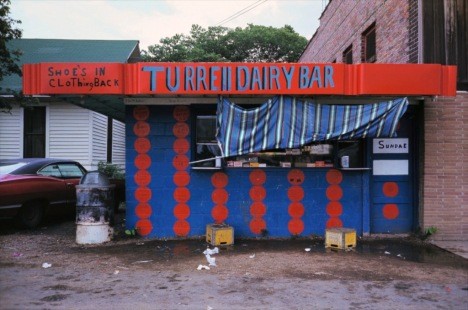William Eggleston
15 Apr 2013 - 11 May 2014

William Eggleston, Untitled, 1970–73
Photograph, dye transfer print on paper 406 x 508 mm
Lent by the American Fund for the Tate Gallery, courtesy of Jane and Michael Wilson
Photograph, dye transfer print on paper 406 x 508 mm
Lent by the American Fund for the Tate Gallery, courtesy of Jane and Michael Wilson
Known for his rich and complex images of the American South, William Eggleston is largely credited with establishing the acceptance of colour in fine art photography.
Eggleston began to experiment with colour in the 1960s. At that time, colour photography was principally associated with commercial industries such as advertising, and was considered unsuitable for fine art photography. In 1972 he began making prints using a highly complex and expensive process called ‘dye transfer’, which allows various colours within a photographic print to be printed as separations. Each colour is printed in its richest form, maintaining strong red and green tones within a single image. The prints are also extremely durable and will not fade.
Mostly shooting in and around his hometown of Memphis,Tennessee, Eggleston depicts the banal and everyday. This room draws upon two series. Chromes is a selection of images from 1969-74 using Kodachrome or Ektachrome film, while Election Eve was taken during the run-up to the 1976 presidential election, and records a road trip around Plains County and Sumter County, Georgia, where Jimmy Carter’s campaign headquarters were based. The ten images from 1976 depict life in what often appears an abandoned and outmoded corner of the country at a moment of high tension and anxiety on the national stage.
Both series include characteristic elements of Eggleston’s style, such as bold colourful interiors, cars and gasoline stations, and portraits of individuals known to Eggleston as well as strangers encountered in the street. Eggleston pays close attention to the complexity of the formal organisation of the frame, often employing strong diagonal lines and reflections, but he also relishes the strength of strong contrasts in colour with vivid reds, blues and greens.
Though these images record a particular place at a certain point in time, Eggleston is not interested in their documentary qualities. Instead, when asked what he is photographing, Eggleston simply answers ‘Life today’.
William Eggleston was born in 1939 in Memphis, Tennessee, where he lives and works.
Eggleston began to experiment with colour in the 1960s. At that time, colour photography was principally associated with commercial industries such as advertising, and was considered unsuitable for fine art photography. In 1972 he began making prints using a highly complex and expensive process called ‘dye transfer’, which allows various colours within a photographic print to be printed as separations. Each colour is printed in its richest form, maintaining strong red and green tones within a single image. The prints are also extremely durable and will not fade.
Mostly shooting in and around his hometown of Memphis,Tennessee, Eggleston depicts the banal and everyday. This room draws upon two series. Chromes is a selection of images from 1969-74 using Kodachrome or Ektachrome film, while Election Eve was taken during the run-up to the 1976 presidential election, and records a road trip around Plains County and Sumter County, Georgia, where Jimmy Carter’s campaign headquarters were based. The ten images from 1976 depict life in what often appears an abandoned and outmoded corner of the country at a moment of high tension and anxiety on the national stage.
Both series include characteristic elements of Eggleston’s style, such as bold colourful interiors, cars and gasoline stations, and portraits of individuals known to Eggleston as well as strangers encountered in the street. Eggleston pays close attention to the complexity of the formal organisation of the frame, often employing strong diagonal lines and reflections, but he also relishes the strength of strong contrasts in colour with vivid reds, blues and greens.
Though these images record a particular place at a certain point in time, Eggleston is not interested in their documentary qualities. Instead, when asked what he is photographing, Eggleston simply answers ‘Life today’.
William Eggleston was born in 1939 in Memphis, Tennessee, where he lives and works.
